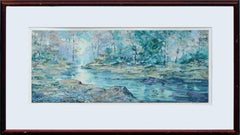Michael Schofield On Sale
1970s American Impressionist Landscape Prints
Paper, Ink
People Also Browsed
21st Century and Contemporary Indian Modern Tableware
Iron
2010s Baroque Still-life Drawings and Watercolors
Emulsion, Watercolor, Photographic Paper, Monoprint, Monotype
2010s Italian Other Dressers
Wood
1870s American Impressionist Landscape Prints
Engraving, Woodcut
2010s American Pillows and Throws
Cotton
2010s Impressionist Landscape Paintings
Linen, Oil
2010s Tonalist Landscape Paintings
Canvas, Oil
2010s Contemporary Paintings
Acrylic
1930s Modern Black and White Photography
Black and White
Late 20th Century Impressionist Landscape Prints
Screen
Marco SassoneSan Francisco from Telegraph Hill Serigraph by Marco Sassone 20th c., Late 20th Century
1980s American Impressionist Figurative Prints
Paper, Ink, Screen
1940s American Modern Paintings
Canvas, Oil
2010s Contemporary Abstract Prints
Digital, Giclée
20th Century Modern Interior Paintings
Oil, Board
1960s Modern Figurative Photography
Archival Pigment
1930s American Impressionist Landscape Prints
Paper, Oil Crayon, Ink
Michael Schofield for sale on 1stDibs
Michael Schofield, a landscape painter and printmaker, was born in Orlando, Florida, in 1947 and moved with his family to Oakland, California, that same year. Growing up, he thought he was going to play pro baseball. In his sophomore year at Oakland High School, under the tutelage of his art teacher Jackie Jensen (brother of internationally recognized watercolorist Robert Jensen), Schofield began to develop his skill in watercolor painting. For the next two years, according to Schofield, "he squeezed endless tubes of paint in his quest to master watercolor and get back to baseball." After high school, Schofield went into the military. Shortly thereafter, he left the Marines to attend the Harris School of Advertising Art in Nashville, Tennessee. During the summer term(s), he studied with well-known watercolorist John Pike, a contemporary of Robert Wood in Woodstock, New York. Two years later, he opened his art studio in Tennessee, where he says, "he taught, painted, and starved." Schofield maintained this studio for 12 years.
In 1980, Schofield returned to California and opened his silkscreen printing studio, where he could create his original serigraphs. Schofield believes that art is fundamentally communication. He chooses to create more traditional landscapes because it is with this imagery that most people relate. "I paint landscapes because they speak to everyone. In sharing a place I have known, I know that others will see places they have known. In that way, I communicate with others without using a single word." Schofield's precision and exactitude somehow meld harmoniously with a more ethereal sense of a place. In this way, his work conveys at once the palpable and the perceptual about a place. He hopes to strike a visceral note in those who view his art, reawakening dormant memories and forgotten feelings. As a successful artist for many years, Schofield's work can be found in many private and corporate collections. His work has been exhibited throughout the United States and seen on such popular motion picture films as The Bridges of Madison County, City Hall, Beethoven and others. He is also a member of the Tennessee Watercolor Society and the National Society of Artists.
Finding the Right Prints And Multiples for You
Decorating with fine art prints — whether they’re figurative prints, abstract prints or another variety — has always been a practical way of bringing a space to life as well as bringing works by an artist you love into your home.
Pursued in the 1960s and ’70s, largely by Pop artists drawn to its associations with mass production, advertising, packaging and seriality, as well as those challenging the primacy of the Abstract Expressionist brushstroke, printmaking was embraced in the 1980s by painters and conceptual artists ranging from David Salle and Elizabeth Murray to Adrian Piper and Sherrie Levine.
Printmaking is the transfer of an image from one surface to another. An artist takes a material like stone, metal, wood or wax, carves, incises, draws or otherwise marks it with an image, inks or paints it and then transfers the image to a piece of paper or other material.
Fine art prints are frequently confused with their more commercial counterparts. After all, our closest connection to the printed image is through mass-produced newspapers, magazines and books, and many people don’t realize that even though prints are editions, they start with an original image created by an artist with the intent of reproducing it in a small batch. Fine art prints are created in strictly limited editions — 20 or 30 or maybe 50 — and are always based on an image created specifically to be made into an edition.
Many people think of revered Dutch artist Rembrandt as a painter but may not know that he was a printmaker as well. His prints have been preserved in time along with the work of other celebrated printmakers such as Pablo Picasso, Salvador Dalí and Andy Warhol. These fine art prints are still highly sought after by collectors.
“It’s another tool in the artist’s toolbox, just like painting or sculpture or anything else that an artist uses in the service of mark making or expressing him- or herself,” says International Fine Print Dealers Association (IFPDA) vice president Betsy Senior, of New York’s Betsy Senior Fine Art, Inc.
Because artist’s editions tend to be more affordable and available than his or her unique works, they’re more accessible and can be a great opportunity to bring a variety of colors, textures and shapes into a space.
For tight corners, select small fine art prints as opposed to the oversized bold piece you’ll hang as a focal point in the dining area. But be careful not to choose something that is too big for your space. And feel free to lean into it if need be — not every work needs picture-hanging hooks. Leaning a larger fine art print against the wall behind a bookcase can add a stylish installation-type dynamic to your living room. (Read more about how to arrange wall art here.)
Find fine art prints for sale on 1stDibs today.
